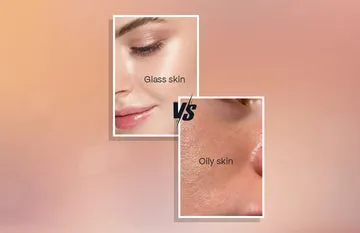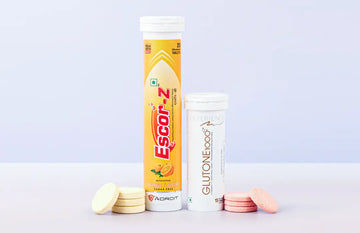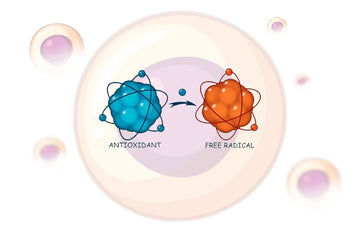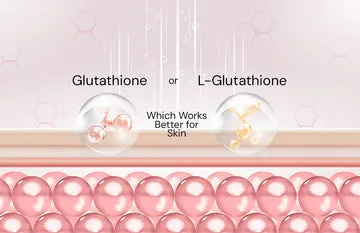In the ever-evolving world of skincare, achieving a luminous complexion is a common goal. However, there's often confusion between glass skin and oily skin. While both can exhibit a certain shine, they are fundamentally different in appearance, texture, and underlying causes. This article delves into the nuances of glass skin vs oily skin, offering insights into their characteristics, and providing guidance on achieving that coveted glow, especially for those with oily skin types.
Glass Skin vs Oily Skin: Defining the Terms
Though they may look similar at first glance, understanding the key differences between glass skin and oily skin is essential for choosing the right skincare approach.
Glass Skin
Originating from Korean beauty trends, glass skin refers to a complexion that is exceptionally smooth, even-toned, and luminous, resembling the clarity and translucence of glass. Achieving this look involves a meticulous skincare regimen focusing on hydration, exfoliation, and nourishment.
Oily Skin
Characterized by an overproduction of sebum, oily skin often appears shiny, particularly in the T-zone (forehead, nose, and chin). This skin type is prone to enlarged pores, blackheads, and acne.
Key Differences:
-
Texture: Glass skin feels soft and supple, whereas oily skin may feel greasy or slick to the touch.
-
Appearance: Glass skin has a dewy, radiant glow; oily skin often has a shiny or greasy appearance.
-
Pore Visibility: Glass skin showcases minimal, barely visible pores; oily skin tends to have enlarged, noticeable pores.
Achieving Glass Skin with Oily Skin: Is It Possible?
Absolutely. While oily skin presents challenges, it's entirely feasible to attain a glass skin appearance by adopting a tailored glass skin routine for oily skin. The focus should be on balancing oil production, maintaining hydration, and strengthening the skin barrier.
Here’s an ideal glass skin routine for oily skin -
1. Double Cleansing: Begin with an oil-based cleanser to remove makeup and sunscreen, followed by a water-based cleanser to eliminate residual impurities.
2. Exfoliation: Incorporate gentle chemical exfoliants like BHA (salicylic acid) 2-3 times a week to unclog pores and prevent breakouts.
3. Hydrating Toner: Use an alcohol-free toner enriched with ingredients like hyaluronic acid to restore moisture balance.
4. Essence: Apply a lightweight essence to enhance hydration and prepare the skin for subsequent products.
5. Serum: Opt for serums containing niacinamide or zinc to regulate sebum production and minimize pore appearance.
6. Moisturizer: Choose a non-comedogenic, gel-based moisturizer to hydrate without clogging pores.
7. Sunscreen: Finish with a broad-spectrum SPF 30 or higher to protect against UV damage, which can exacerbate oiliness and lead to hyperpigmentation.
Implementing this glass skin routine for oily skin consistently can transform the skin's appearance, leading to a balanced, radiant complexion.
Also Read, How to Manage Oily Skin
Glass Skin Products for Oily Skin
Selecting appropriate products is crucial. Here are some glass skin products for oily skin:
-
Cleansers: Gentle foaming cleansers with salicylic acid to control oil without over-drying.
-
Toners: Alcohol-free formulas with witch hazel or green tea extract to soothe and balance.
-
Serums: Niacinamide-based serums to reduce sebum production and refine pores.
-
Moisturizers: Oil-free, gel-based moisturizers with hyaluronic acid for hydration.
-
Sunscreens: Matte-finish, non-comedogenic sunscreens to protect without adding shine.
Incorporating these glass skin products for oily skin can aid in achieving a luminous yet balanced complexion.
Key Ingredients for Glass Skin in Oily Skin Types
-
Niacinamide: Regulates oil production, minimizes pores, and improves skin texture.
-
Salicylic Acid: A BHA that penetrates pores to exfoliate and reduce acne.
-
Hyaluronic Acid: Provides hydration without adding oil, maintaining skin plumpness.
-
Zinc: Controls sebum production and possesses anti-inflammatory properties.
-
Green Tea Extract: Rich in antioxidants, it soothes the skin and reduces sebum.
These ingredients are often found in glass skin products for oily skin, making them ideal choices for those seeking a radiant complexion without excess oil.
The Role of Glutathione in Achieving Glass Skin
Glutathione, a powerful antioxidant, plays a significant role in skin health. It neutralises free radicals, reduces oxidative stress, and promotes a brighter, more even skin tone. For individuals with oily skin, incorporating a glutathione tablet can aid in detoxifying the skin and reducing inflammation, contributing to a clearer, more luminous complexion.
Highlighting Key Ingredients in Effective Skincare Products
When selecting skincare products aimed at achieving glass skin, consider the following ingredients:
-
L-Glutathione: Enhances skin brightness and combats oxidative stress.
-
Vitamin C: Promotes collagen production and reduces pigmentation.
-
Niacinamide: Improves skin elasticity and barrier function.
-
Hyaluronic Acid: Provides deep hydration, essential for a plump appearance.
-
Salicylic Acid: Exfoliates and unclogs pores, preventing acne.
These ingredients are commonly found in products formulated for oily skin, aiding in the journey towards glass skin.
Introducing Glutone 1000: Your Partner in Achieving Glass Skin
For those seeking to enhance their skin's radiance from within, Glutone 1000 offers a potent solution. This glutathione tablet is designed to support skin health by:
-
Providing antioxidant protection against environmental stressors.
-
Promoting an even skin tone and reducing pigmentation.
-
Supporting detoxification processes, beneficial for oily skin types.
Incorporating Glutone 1000 into your skincare regimen can complement topical treatments, offering a comprehensive approach to achieving glass skin.
Understanding the distinctions between glass skin vs oily skin is pivotal in tailoring an effective skincare routine. While oily skin presents unique challenges, with the right products and ingredients, achieving a luminous, glass-like complexion is attainable. By incorporating targeted glass skin products for oily skin, adhering to a consistent glass skin routine for oily skin, and considering supplements like a glutathione tablet, you can embark on a transformative journey towards radiant skin.








 Mon to Sat - 10 am to 7 pm
Mon to Sat - 10 am to 7 pm